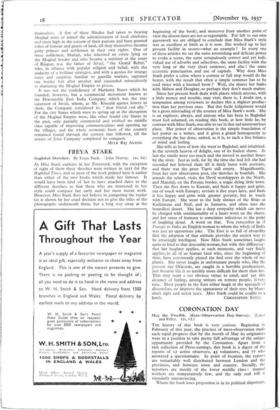FREYA STARK
Baghdad Sketches. By Freya Stark. (John Murray. its. 6d.) As Miss Stark explains in her Foreword, with the exception of eight of them these sketches were written in 1931 for the Baghdad Times, and so most of the work printed here is earlier than either of the two books which made her famous. It would have been kind of her to have attached dates to the different sketches, so that those who are interested in her style could compare her early and her most recent work. However, Miss Stark does not believe in pampering the reader (as is shown by her cruel decision not to give the titles of the photographs underneath them, but a long way away at the
beginning of the book), and moreover from another point of view the absent dates are not so regrettable. For left to our own guesswork we are obliged to conclude that Miss Stark's style was as excellent at birth as it is now. She worked up to her present facility in secret—what an example ! In every one of these articles we see the same astonishing and delicate power to evoke a scene, the same scrupulously correct and yet indi- vidual use of adverbs and adjectives, the same facility with the very long or the very short sentence, and alas ! the same eccentric punctuation and use of capitals. Why does Miss Stark prefer a colon where a comma or full stop would do.far better, with the result that often a simple sentence has to be
read twice with a knotted brow ? Well, she shares her faults with Milton and Doughty, so perhaps they don't much matter. Since her present book deals with places which anyone, with a little money and trouble, may visit, there is, I doubt not, a temptation among reviewers to declare this a slighter produc- tion than her previous ones. But this facile judgement would be a gross misreading of the essence of Miss Stark's work. She is an explorer, always, and anyone who has been to Baghdad
must feel ashamed, on reading this book, at how little he, by contrast with Miss Stark, was able to see in that sad unmysterious place. Her power of observation is the simple foundation of her power as a writer, and it gives a grand homogeneity to everything she has done, united, as it is, to such a fine balance of mind and feeling.
She tells us here of how she went to Baghdad, and inhabited, in the seventh heaven of delight, one of its foulest slums. At last the smells were too much and she moved to another house by the river. Just as well, for by the time she had left she had recorded her beloved slum till it fairly burst with portraits, and there was the great Tigris still empty. Magnificently, from her new observation post, she sketches in boatfuls. •She attends the school, visits the Devil worshippers in the North, and Mandali, on the Persian border, a tragic dying little town. Then she flies down to Kuwait, and finds it happy and grim, out of touch with Europe; revisits it five years later, and finds it less happy and grim with greater poverty,. but in touch with Europe. She went to the holy shrines of the Shias at Kadhimain and Nejf, and to Samarra, and often into the boundless desert. She has a deep sympathy which can never be charged with sentimentality or a heart worn on the sleeve, and her sense of humour is sometimes infectious to the point of laughing aloud. A word on that. You remember in A Passage to India an English woman to whom the whole of India was just an uproarious joke. The East is so full of absurdity that the adoption of that attitude provides the easiest way to be amusingly intelligent. Now Migs Stark sometimes laughs quite as loud as that detestable woman, but with this difference : that her laughter applies, at such moments, and very finely applies, to all of us human kind who, since the beginning of time, have consistently played the fool over the whole of our planet. She never laughs at unfortunate people who, like the present day Orientals, are caught in a horrible predicament, just because life is so terribly more difficult for them than her. This may seem a too obvious virtue to extol, and yet this decency of feeling, among writers on remote people, is very rare. Most people in the East either laugh at the spectacle of discomfort, or improve the appearance of their eyes by bleary short sight and onion tears. Miss Stark could be oculist to a
















































































































 Previous page
Previous page